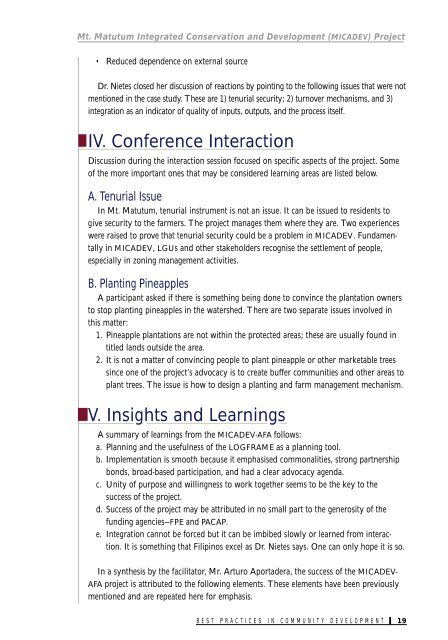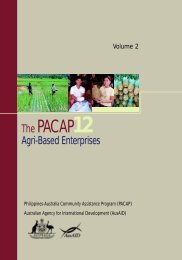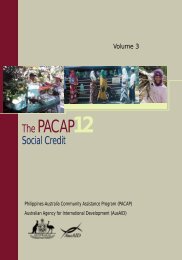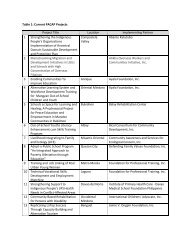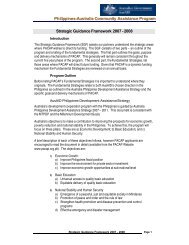The PACAP12
The PACAP12
The PACAP12
You also want an ePaper? Increase the reach of your titles
YUMPU automatically turns print PDFs into web optimized ePapers that Google loves.
Mt. Matutum Integrated Conservation and Development (MICADEV) Project<br />
• Reduced dependence on external source<br />
Dr. Nietes closed her discussion of reactions by pointing to the following issues that were not<br />
mentioned in the case study. <strong>The</strong>se are 1) tenurial security; 2) turnover mechanisms, and 3)<br />
integration as an indicator of quality of inputs, outputs, and the process itself.<br />
IV. Conference Interaction<br />
Discussion during the interaction session focused on specific aspects of the project. Some<br />
of the more important ones that may be considered learning areas are listed below.<br />
A. Tenurial Issue<br />
In Mt. Matutum, tenurial instrument is not an issue. It can be issued to residents to<br />
give security to the farmers. <strong>The</strong> project manages them where they are. Two experiences<br />
were raised to prove that tenurial security could be a problem in MICADEV. Fundamentally<br />
in MICADEV, LGUs and other stakeholders recognise the settlement of people,<br />
especially in zoning management activities.<br />
B. Planting Pineapples<br />
A participant asked if there is something being done to convince the plantation owners<br />
to stop planting pineapples in the watershed. <strong>The</strong>re are two separate issues involved in<br />
this matter:<br />
1. Pineapple plantations are not within the protected areas; these are usually found in<br />
titled lands outside the area.<br />
2. It is not a matter of convincing people to plant pineapple or other marketable trees<br />
since one of the project’s advocacy is to create buffer communities and other areas to<br />
plant trees. <strong>The</strong> issue is how to design a planting and farm management mechanism.<br />
V. Insights and Learnings<br />
A summary of learnings from the MICADEV-AFA follows:<br />
a. Planning and the usefulness of the LOGFRAME as a planning tool.<br />
b. Implementation is smooth because it emphasised commonalities, strong partnership<br />
bonds, broad-based participation, and had a clear advocacy agenda.<br />
c. Unity of purpose and willingness to work together seems to be the key to the<br />
success of the project.<br />
d. Success of the project may be attributed in no small part to the generosity of the<br />
funding agencies—FPE and PACAP.<br />
e. Integration cannot be forced but it can be imbibed slowly or learned from interaction.<br />
It is something that Filipinos excel as Dr. Nietes says. One can only hope it is so.<br />
In a synthesis by the facilitator, Mr. Arturo Aportadera, the success of the MICADEV-<br />
AFA project is attributed to the following elements. <strong>The</strong>se elements have been previously<br />
mentioned and are repeated here for emphasis.<br />
B E S T P R A C T I C E S I N C O M M U N I T Y D E V E L O P M E N T 19


